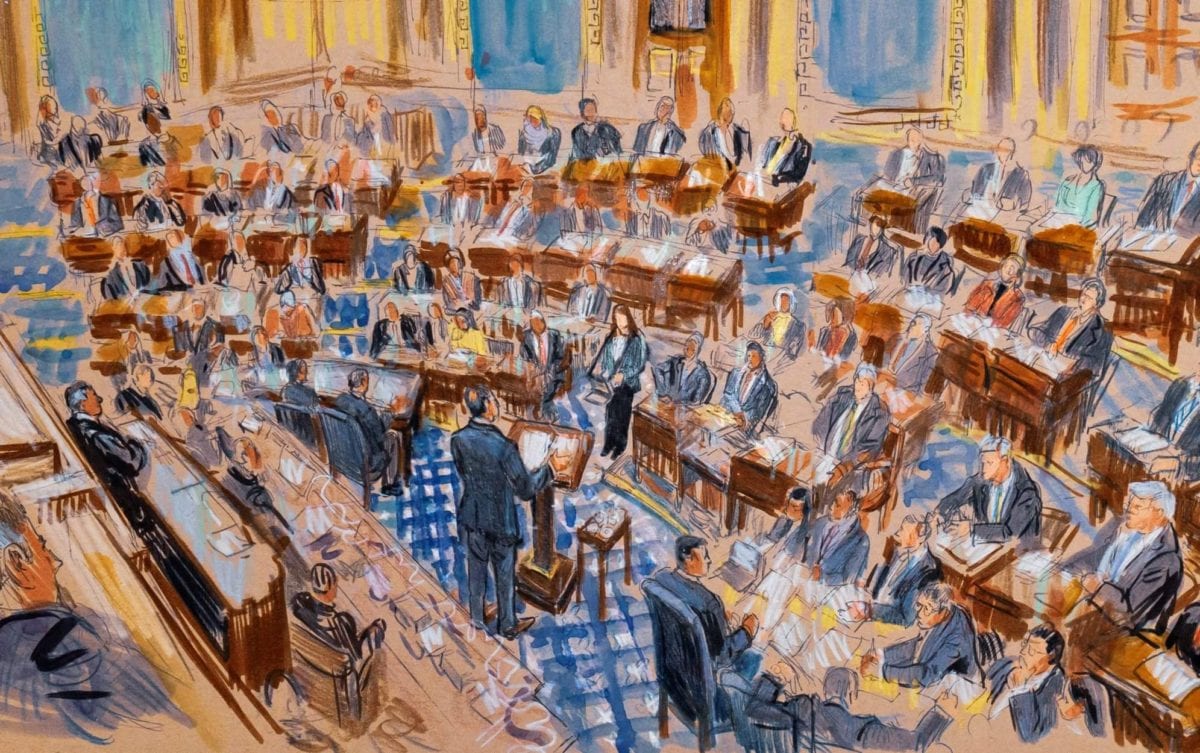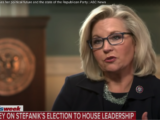Senator Doug Jones of Alabama Says House Managers Are Making A Compelling Case –

No cameras are allowed in the Senate chamber during the impeachment trial, so news organizations are forced to rely on artist sketches by Dana Verkouteren
By Glynn Wilson –
The House legal team prosecuting President Donald J. Trump in the Senate impeachment trial seemed to hit its stride somewhere between the half way point of day two and into day three. They must have gotten the message that their matter-of-fact, monotone presentation style was putting people to sleep, not just the Republicans in the Senate chamber but the audience watching live on national television.
By the end of day three, Congressman Adam Schiff made an impassioned appeal as the clock ticked past 10 p.m.
“You know you can’t trust this president to do what’s right for this country — you can trust he will do what’s right for Donald Trump,” he said, nearly breaking into tears. “This is why if you find him guilty, you must find that he should be removed. Because right matters. Right matters and the truth matters. Otherwise we are lost.”
While the opening days of the impeachment trial on Tuesday and Wednesday drew a national audience of about 11 million viewers, according to the Neilson ratings, people were complaining about falling asleep, including Republican Senators who were drawn asleep in their desks by the artist depicting the scene in the absence of photographers and cameras in the chamber.
The Power of Fear and Twitter Loom Over Impeachment Trial of President Donald Trump
I asked U.S. Senator Doug Jones of Alabama about this in a press conference call on Thursday morning before the proceedings began, wondering if the House had made a mistake by not finding a fiery orator to lead the charge to capture the attention of the American people, say like Huey Long of Louisiana for example.
Senator Jones pointed out that Schiff and the other House prosecutors are not only addressing the American people, but United States Senators “in what is supposed to be the most deliberative body in the world.”
“I think they are making a compelling case,” Jones said. “I don’t think you have to have a fiery orator. I certainly haven’t had trouble staying awake. I’ve probably got well over 100 pages of notes already, because that’s just what I do. I take notes. I highlight them. Then I go back and review and try to figure out what questions I might want to ask.”
He may get that chance next week.
In his opening remarks, Jones said the atmosphere in the Senate chamber has been “very serious, very somber.”
“People are feeling the constitutional weight of this. I am certainly feeling the weight of the constitution and my oath on my shoulders during these proceedings,” he said. “I really hope my colleagues do too. They are paying attention.”
So far he has seen a compelling case presented by the House managers, he said, “but we still have a ways to go.”
“We still need to hear from the president’s lawyers, and I hope they come in with substantive arguments,” he said.
“Quite frankly I was disappointed in the first day in arguing about the rules. The House managers presented compelling arguments about why we needed witnesses and documents, and the president’s counsel’s response was more finger pointing and critical of the House process rather than addressing whether or not we need to see those,” he said. “So I hope that when we get into the facts of this case, they will also be substantive and set forth both their factual and legal arguments.”
He pointed out that the administration is still withholding documents, and obstructing Congress from calling witnesses. There will be another vote on this next week, after the president’s team makes their defense case.
“We need to have that in order to make sure we have as complete a picture as possible,” Jones said. “Every American, every Alabamian knows what a real trial looks like. A real trial has witnesses … documents and cross examination. But because of Senator McConnell’s rules, we’re not in that kind of real trial.
“What we’ve seen so far is a summary of previous testimony and the presentation of only a few documents, most of which the administration did not turn over but were obtained through a FOIA (Freedom of Information Act) lawsuit or other means,” he said. “So while the case may be compelling, it is certainly not going to be complete.
“That’s not to say that there will not be enough evidence from which to make a sound judgement,” he said. “But that’s not all the people deserve. We wanted to see these witnesses now, not later.”
Also in his opening remarks, Jones mentioned the half a million dollars in ads targeting him in the impeachment trial all over the state.
“If they really think they can influence how I vote by spending $450,000 on a half-baked commercial, then they really just don’t know me very well,” Jones said. “That’s more of a political ad … and I hope people will see that. Candidly, they would do Alabamians more good if they spent that time advocating for rural broadband, if they spent that money advocating to get access to health care, for maternal care, for infant mortality, instead of just making stuff up about my record and using silly scare tactics to divide people.”
In addressing my question about the historic nature of the impeachment trial, Senator Jones said he thinks everyone recognizes that “no matter how it comes out, it’s still a historic occasion.
“This is only the third presidential impeachment that we’ve had in our 200 plus year history. So from my standpoint, I am looking at this for what we’re going to be saying to the next president, the next House of Representatives and the next Senate,” he said. “I try to look at this not with regard to the name of this particular president. Because I don’t look at this as pure punishment if he did what the articles of impeachment say he did. I look at this as what kind of president do we want and deserve in this country. What kind of president does the Constitution envision. Going forward, the actions of the president are so important and the actions of the House and Senate and how they relate to that are also important.
“I did not anticipate being in this position when I ran and got elected for this office,” he said. “But I’m going to do my duty.”
Making the Case
According to reporting by other news organizations, including the New York Times, the House Democratic impeachment managers began formal arguments in the Senate trial on Wednesday, “presenting a meticulous and scathing case for convicting President Trump and removing him from office on charges of abuse of power and obstruction of Congress.”
“Speaking in an even, measured manner, (Schiff) accused the president of a corrupt scheme to pressure Ukraine for help ‘to cheat’ in the 2020 presidential election.”
Invoking the nation’s founders and their fears that a self-interested leader might subvert democracy for his own personal gain, Schiff argued that the president’s conduct was “precisely what the framers of the Constitution had in mind when they devised the remedy of impeachment, one he said was ‘as powerful as the evil it was meant to combat’.”
“If not remedied by his conviction in the Senate, and removal from office, President Trump’s abuse of his office and obstruction of Congress will permanently alter the balance of power among the branches of government,” Schiff said in his opening remarks. “The president has shown that he believes that he’s above the law and scornful of constraint.”
In a series of addresses, Schiff and the six other impeachment managers showed how Trump pressured Ukraine to announce an investigation of former Vice President Joe Biden and his son Hunter, while withholding nearly $400 million in security aid as leverage in a clear quid pro quo. When Trump was caught, they said, the president ordered a cover-up, blocking witnesses and denying Congress the evidence that could corroborate his scheme.
“President Trump withheld hundreds of millions of dollars in military aid to a strategic partner at war with Russia to secure foreign help with his re-election,” Schiff declared. “In other words, to cheat.”
The prosecutors continued to lay out their case on Thursday and into Friday, flatly turning down a leaked Republican deal to trade the testimony of a witness to Trump’s dealings with Ukraine, former National Security Advisor John Bolton, for Hunter Biden, who technically has nothing to do with the charges against Trump. The argument goes that is a fake news fantasy cooked up by Trump and his team that there is some parallel to what Biden did to fight corruption in Ukraine as Vice Present to what Trump did to create more corruption for his own political purposes.
Schiff insisted in his opening arguments that fairness demanded hearing from Bolton, who has pledged to testify if the Senate subpoenas him, and other White House officials. Democrats angrily rejected the suggestion that they might agree to call Hunter Biden in exchange for Bolton’s appearance.
“This isn’t like some fantasy football trade,” Mr. Schiff said before the trial commenced Wednesday. “Trials aren’t trades for witnesses.”
Senator Chuck Schumer of New York, the Democratic leader, told reporters the idea was “off the table.”
Campaigning in Iowa, Joseph Biden was adamant in rejecting any testimony trade-off. “This is a constitutional issue,” he said. “We’re not going to turn it into a farce, into some kind of political theater.”
On the Senate floor, the prosecutors sought to place Trump’s Ukraine pressure campaign in the context of what they called a broader impulse by the president to cede America’s foreign policy to Russia, according to the Times. It was no coincidence, Schiff argued, that Trump had asked the president of Ukraine for investigations into his rivals just one day after Robert Mueller, the special counsel who investigated Russia’s interference in the 2016 election, issued his report.
“President Trump, believing he had escaped accountability for Russia meddling in the first election, and welcoming of it, asked the Ukrainian president to help him undermine the special counsel’s conclusion and help him smear a political opponent,” Schiff said.
The president vented his spleen about the process on Twitter, firing off so many posts that he set a record for any single day in his presidency.
As of 11:30 p.m., Trump had posted or reposted 142 messages on Twitter, surpassing the previous record of 123 set in December. Most were retweets of messages from allies and supporters assailing Schiff and others prosecuting the case.
According to summary reporting from the Washington Post, Schiff spent two of those hours Wednesday laying out the broad outlines of the case.
Democrats are not overstepping their bounds by impeaching Trump and telling the Senate to kick him out of office, Schiff said. In fact, they’d be ignoring their duty not to impeach him.
“The framers of the Constitution empowered Congress to thoroughly investigate presidential malfeasance and to respond, if necessary, by removing the president from office,” Schiff said.
Then he outlined the evidence Democrats gathered to show that Trump withheld an Oval Office meeting for political gain and how Trump withheld money Congress approved for Ukraine for the same political purposes.
Schiff argued that a quid pro quo happened if you take a common-sense approach to reading Trump’s rough transcript with Ukraine’s president and other evidence.
“President Trump conditioned hundreds of millions of dollars in congressionally appropriated, taxpayer-funded military assistance for the same purpose,” Schiff said. “To apply more pressure on Ukraine’s leader to announce the investigations.”
Then Schiff argued that if the Senate didn’t throw Trump out of office, it would undermine the standing of America in the world.
“Vladimir Putin would like nothing better” than for Republicans to acquit Trump, Schiff said.
Impeachment managers spent the rest of the day chronicling Trump’s actions on Ukraine in a detailed timeline.
As Tuesday’s debate on the Senate trial rules dragged on into Wednesday morning, Nadler grew frustrated and raised his voice, accusing Republican senators of “treacherous” behavior for not allowing witnesses. After one of Trump’s lawyers angrily responded, Chief Justice John G. Roberts Jr. told both sides to “remember where they are” and be more polite.
Senator Lamar Alexander, the Republican from Tennessee who is retiring and not running for another term, said in a tweet on Tuesday that he’d be open to considering voting to allow witnesses. He will have another chance next week, along with Mitt Romney of Utah, Lisa Murkowski of Alaska and Susan Collins of Maine. Only four Republican votes are needed for a 51 vote simple majority to allow witnesses.
On Thursday, according to the Post, House impeachment prosecutors laid out the heart of their abuse-of-power case against President Trump — charging that his efforts to pressure Ukraine into political investigations were precisely what the nation’s founders wanted to guard against when they empowered Congress to remove a president from office.
House Judiciary Committee Chairman Jerrold Nadler of New York led the case for Democrats on Thursday, cited “abuse, betrayal and corruption” as not only the offenses that the nation feared the most when they wrote the Constitution, but also those alleged abuses at the core of Trump’s dealings with Ukraine.
“The president’s abuse of power, his betrayal of the national interest, and his corruption of our elections plainly qualify as great and dangerous offenses,” Nadler said. “President Trump has made clear in word and deed that he will persist in such conduct if he is not removed from power.”
Nadler made a case to the Senate that it would be unreasonable to expect Congress to envision all types of potential presidential corruption and pass laws explicitly forbidding it.
“The Constitution is not a suicide pact,” Nadler said. “It does not leave us stuck with presidents who abuse their power in unforeseen ways that threaten our security and democracy. Until recently, it did not occur to me that our president would call a foreign leader and demand a sham investigation meant to kneecap his political opponents, all in exchange for releasing vital military aid that the president was already required by law to provide.”
Congressman Hakeem Jeffries is an emerging star from the impeachment trial, who may be next in line for Speaker of the House.
Standing on the House floor hours before voting to impeach President Trump, Jeffries, who is seen as touch and pithy, issued a characteristically quotable pledge.
“We will impeach Donald John Trump,” said the New York democrat said. “We will clarify that, in America, no one is above the law.”
Jeffries will help take the House Democrats’ case for removing President Trump to the Senate













